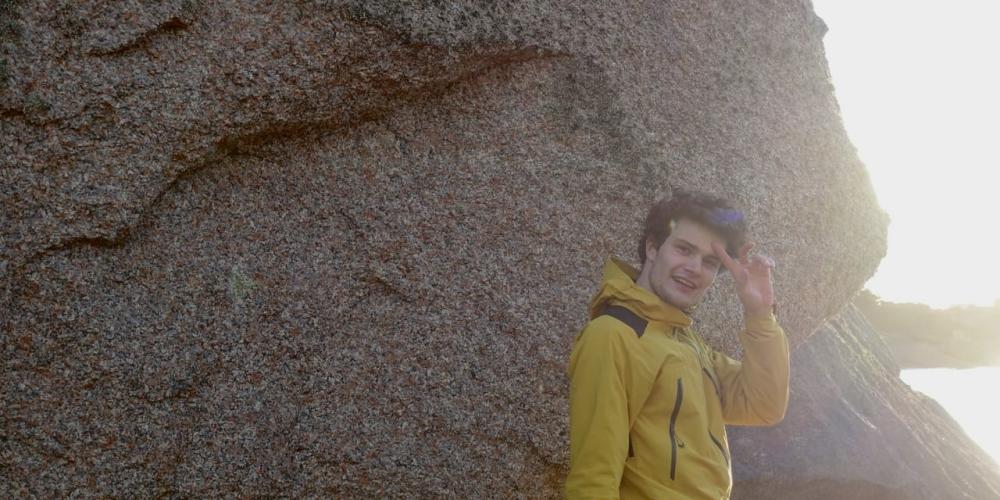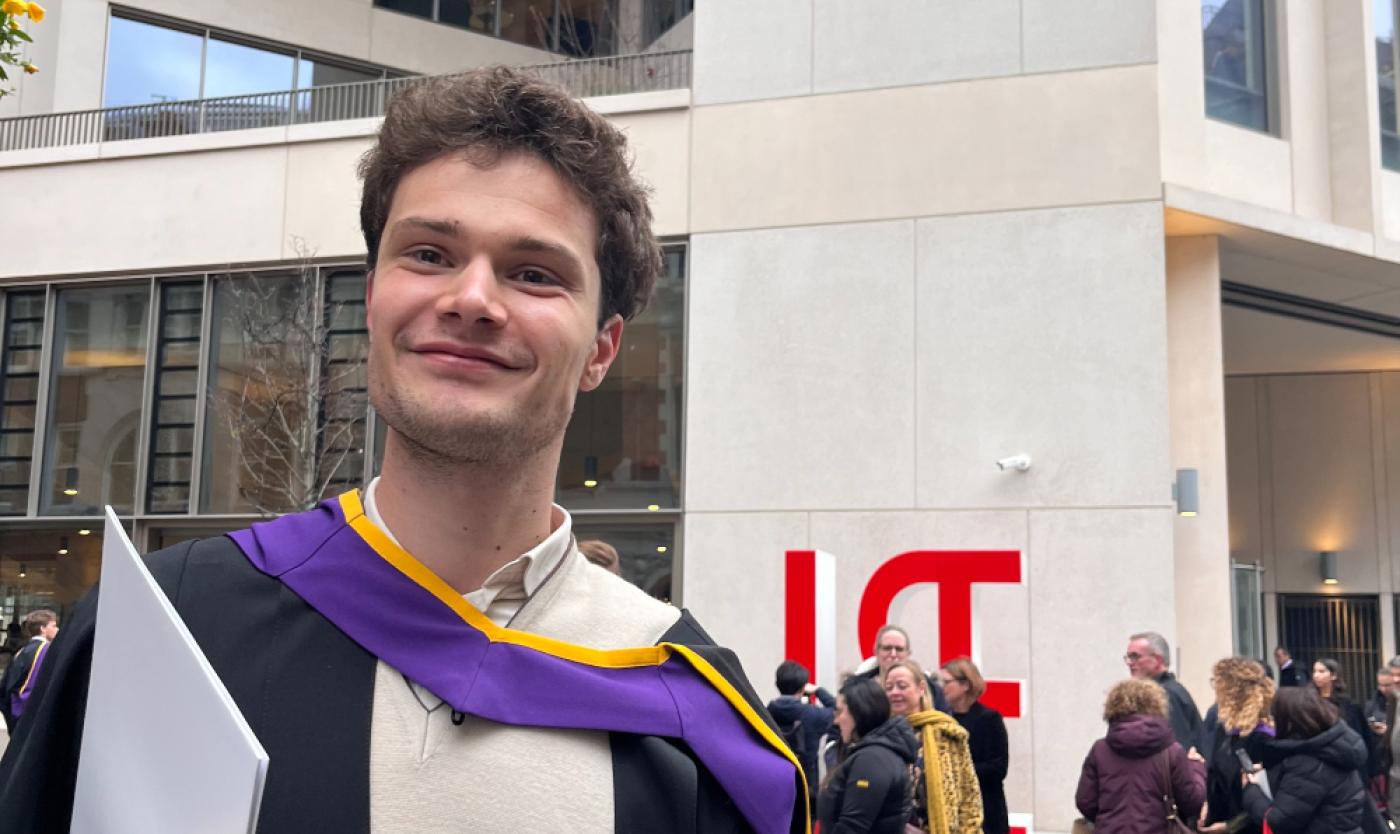
Hendrik Van de Pol grew up in Turnhout (Belgium) and comes from a background where it wasn’t obvious to go to university. He’s immensely grateful to his parents for the opportunity to be the first in his family to go to university. He chats to the VUB International Relations office from his UN internship in Nairobi, and talks about the opportunities he got to study and venture abroad thanks to different scholarships, but also the challenges that he met along the way.
Fayat scholarship
Hendrik studied Political Sciences at the VUB, and while doing his Bachelor’s degree, he went on an Erasmus+ exchange to Rome for one year. He continued his studies with a Master’s in Urban studies and thought of going to Gent University afterwards to study some more, but it didn’t work out. “That turned out to be a good thing in the end. I was doing my Master’s in Urban Studies (during the covid pandemic; not obvious), and managed to do an internship in Paris with Erasmus+. I clearly remember getting the email that would change things; it was from Marjan Maes, the internationalisation coordinator at the Faculty of Sciences & Bioengineering Sciences, where she mentioned the Fayat scholarship and the destinations. I went to a coffee shop, and spent all day reading her email, and all the information in it, and checked out the websites. A week later I applied for the scholarship and decided I wanted to do Development Studies in London, either at SOAS or LSE.”
Several months later, and after lots of paperwork, Hendrik heard he got accepted by both the University of London School of Oriental and African Studies (SOAS) and the London School of Economics (LSE). He sat for an interview with the people from the Fayat Scholarship to talk to them about leadership and motivation, and was told there he got in to both institutions. In the end he opted for a one year study programme at LSE.
The Fayat Scholarship, offered by the Flemish Government, is aimed at talented students from Flanders to give them the opportunity to continue their studies at top universities across the world. The Flemish Government looks for excellent students who become ‘active Fayat-alumni’, and who will act as representatives of Flanders to help put the region on the map. The criteria to be considered for the scholarship are fairly succinct: have a Master’s degree from a university or university college in Flanders not more than three years prior to applying for the scholarship; have excellent study results, and excellent spoken and written Dutch; want to study at one of the selected top institutions and be admitted at the time the scholarship is awarded; not have any other scholarships at the time, and have Belgian citizenship.
After having completed their studies, Fayat Scholarship students are expected to contribute to the international network of Flanders. The amount students get is enough to cover to the maximum extent of the costs of education, accommodation, living and travel for the standard duration of their studies, with a maximum of 24 months. The list[1] of institutions and disciplines is impressive and includes the ‘crème de la crème’ of universities across the world.
“I would totally recommend applying for a Fayat scholarship. Not enough people know it exists and the opportunities it gives is very impressive. Students should already be made aware of it during their Bachelor programme so they can work towards it. It is very competitive (some 10-20 students per year get selected), but it is so worth it!”, Hendrik adds.
Asked if he would have gone to study in London if he hadn’t had the Fayat scholarship, Hendrik says he wouldn’t have had the financial means to do it on his own: “Many of the other applicants would still have gone, because they could have managed it financially, but for me having that scholarship made all the difference. I’d not have gone to London but would’ve looked for a job instead. It’s one thing that I would like to point out to the organisers of the Fayat scholarship: maybe look for more diversity and social difference among applicants, so that those who actually really need that kind of financial support, get the opportunity.”

VUB, your alma mater
How does Hendrik look back at his time at the VUB, especially as he’s been to several other universities meanwhile, in Rome, in Paris, in London? “It’s been such an amazing journey. I come from Turnhout from a family where, along with my sister, I’m the first to have studied at university. Along the way during my Bachelor’s degree I moved to Brussels, and the world started opening up to me. Doing an Erasmus+ exchange in Rome and then afterwards an internship in Paris… I count myself so lucky to have had the financial support each time. VUB is and always was a safe space for me. It’s a small and family-level university, where you are free to discover yourself and be young. It’s the essence of studying at the VUB: it allows its students freedom and room for self-development. Especially if I compare it to LSE in London e.g., where things were a lot more ‘serious’ and focused on hard work. The academics and teaching staff at the VUB are among the best I’ve met as well; they are so passionate about their work. My studies at VUB were a great basis for everything that followed after.”
VUB also encouraged Hendrik to look further afield during his studies. The exchange options while studying and the financial support made it possible for him to look at where he wanted to go. “In my experience Belgians are very much ‘stay-at-home’ people; it isn’t a obvious thought to go abroad (for studies, for work). My mind worked differently: especially getting something like the Fayat scholarship, I feel it’s important to grasp the opportunities presented for personal development but also for your career. It helps that you can show you’ve had experience abroad, developed language skills. It’s important that students know this.”
When you returned from your first stint abroad, did you come back with a different mindset, especially looking at the vast international student community we have here at the VUB? “Totally, because you realise it isn’t always easy being abroad, out of your comfort zone. It can be lonely, and you need to be curious and at times force yourself to go out and about; you need to push those boundaries, so when I got back from Rome, I had a lot more empathy towards the international students at the VUB.”
What advice do you have for VUB students, especially looking towards their time post-study? “The world outside university is competitive for (highly) educated people. The number of jobs are not infinite, and once you start, you do need to put hard work in. You really need to persevere, and find your passion. It might be a bit of a shock after studying, but you know, it’s all worth it. Like my internship now with the UN in Nairobi (through the Flanders Trainee Programme): I learn so much and I really see it as a transition moment. I think when I’m done here in June, I’ll look to coming back to Europe and maybe settle in Brussels or London or Paris. The ‘go abroad’-bug is in me still!”
[1] List is in Dutch according to discipline: https://www.vlaanderen.be/fayatbeurs-aanvragen/fayatbeurs-topinstellingen-en-vakgebieden
- Want to find out what your opportunities are to go abroad or do an internship during your studies? Check out the Go Abroad pages on the VUB website.
- Want to know more about the Fayat scholarships? Check out the Flemish Government website (in Dutch).